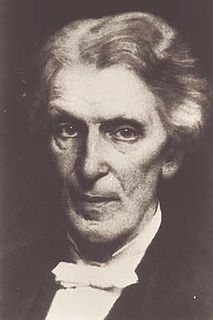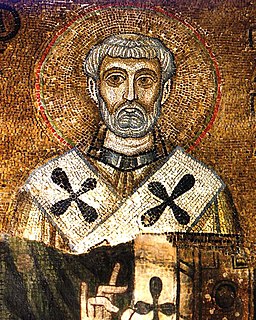A Quote by David Jeremiah
We have nothing in our account but zeroes! And yet, because of His great love, God forgave us our astronomical debt.
Related Quotes
There are two gods. The god our teachers teach us about, and the God who teaches us. The god about whom people usually talk, and the God who talks to us. The god we learn to fear, and the God who speaks to us of mercy. The god who is somewhere up on high, and the God who is here in our daily lives. The god who demands punishment, and the God who forgives us our trespasses. The god who threatens us with the torments of Hell, and the God who shows us the true path.
There are two gods. A god who casts us off because of our sins, and a God who calls to us with His love.
We cannot embrace His cross, and yet refuse our own. We cannot raise the cup of His remembrance to our lips, without a secret pledge to Him, to one another, to the great company of the faithful in every age that we, too, hold ourselves at God's disposal, that we will ask nothing on our own account, that we will pass simply into the Divine hand to take us whither it will.
Who can describe the bond of God's love? Who is able to explain the majesty of its beauty? The height to which love leads is indescribable. ... In love the master received us, Jesus Christ our Lord, in accordance with God's will gave his blood for us, and his flesh for our flesh, and his life for our lives.
We are children, perhaps, at the very moment when we know that it is as children that God loves us - not because we have deserved his love and not in spite of our undeserving; not because we try and not because we recognize the futility of our trying; but simply because he has chosen to love us. We are children because he is our father; and all of our efforts, fruitful and fruitless, to do good, to speak truth, to understand, are the efforts of children who, for all their precocity, are children still in that before we loved him, he loved us, as children, through Jesus Christ our lord.
Man depends on God for all things: God depends on man for one. Without man's love God does not exist as God, only as creator, and love is the one thing no one, not even God himself, can command. It is a free gift or it is nothing. And it is most itself, most free, when it is offered in spite of suffering, of injustice, and of death . . . The justification of the injustice of the universe is not our blind acceptance of God's inexplicable will, nor our trust in God's love, his dark and incomprehensible love, for us, but our human love, notwithstanding anything, for him.
Because Jesus Christ has prepared Himself from the foundations of the world we can trust Him as one uniquely qualified through the fullness of His love for His Father and us. His love, meekness, condescension, knowledge, power, commitment to agency, and obedience combine to bring this elusive peace to all of God’s children. Our peace was purchased by the shedding of the innocent blood of God’s purest Son. Our trust in His capacity to bring us this peace can be complete because that has been part of His work and His glory from the beginning.
Prayer is the converse of the soul with God. Therein we manifest or express to Him our reverence, and love for His divine perfection, our gratitude for all His mercies, our penitence for our sins, our hope in His forgiving love, our submission to His authority, our confidence in His care, our desires for His favour, and for the providential and spiritual blessings needed for ourselves and others.
Our God is a God of love. He waits with open arms, and the unfolding of His merciful plan of salvation is not only therefore the mark of divine power but also the mark of God's relentless, redeeming love. It is a point well worth pondering because, among other reasons, it will help us to understand better why God, through the prophets, denounces sin and corruption in such scalding terms. He loves all of us, His spirit sons and daughters, but hates our vices. His denunciation of those vices may, if we are not careful, seem to obscure the enormous and perfect love He has for us.
There is nothing that we can properly call our own but our time, and yet everybody fools us out of it who has a mind to do it. If a man borrows a paltry sum of money, there must needs be bonds and securities, and every common civility is presently charged upon account. But he who has my time thinks he owes me nothing for it, though it be a debt that gratitude itself can never repay.
Why pray? Evidently, God likes to be asked. God certainly does not need our wisdom or our knowledge, nor even the information contained in our prayers ("your Father knows what you need before you ask him"). But by inviting us into the partnership of creation, God also invites us into relationship. God is love, said the apostle John. God does not merely have love or feel love. God is love and cannot not love. As such, God yearns for relationship with the creatures made in his image.
He loves us because He is filled with an infinite measure of holy, pure, and indescribable love. We are important to God not because of our resume but because we are His children. He loves every one of us, even those who are flawed, rejected, awkward, sorrowful, or broken. God's love is so great that He loves even the proud, the selfish, the arrogant, and the wicked.
God's unfailing love for us is an objective fact affirmed over and over in the Scriptures. It is true whether we believe it or not. Our doubts do not destroy God's love, nor does our faith create it. It originates in the very nature of God, who is love, and it flows to us through our union with His beloved Son.
God’s love sets us free from the need to seek approval. Knowing that we are loved by God, accepted by God, approved by God, and that we are new creations in Christ empowers us to reject self-rejection and embrace a healthy self-love. Being secure in God’s love for us, our love for Him, and our love for ourselves, prepares us to fulfill the second greatest commandment: To love our neighbor as ourselves.






































